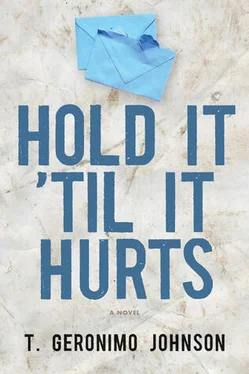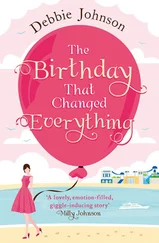After the screening, they went to lunch with Ines’s tall friend Margaret, who reminded Achilles of someone he knew long ago. She sighed frequently as if awaiting a train long overdue, and had a tiny, upturned nose much too small for her long face. Her skin was deep brown, and her large teeth perfect. She stood very straight, back and neck in one long, unyielding line. Ines and Margaret met with a gasp and an “Ooh girl” in the theater lobby, supposedly surprised by their good fortune. Achilles thought it extremely unfair that he would have to take the friend test before they’d even had sex.
They ate at Minette’s, a small restaurant in the French Quarter. Along one side of the dining room ran a bar behind which men in black rubber aprons told jokes while serving beer and oysters, shucked just that minute, to the patrons lucky enough to sit there. Ines chose a table next to the window. While they waited to order, Margaret mentioned how much she liked the movie, as well as the videos that played before and after it.
Ines hadn’t enjoyed the video, describing it as another example of “rich people indulging obsessions.”
“You say that with such envy,” said Margaret. “Has Achilles seen the servant show, the old I-hire-folks-who-look-like-you? Vaudeville isn’t it, Achilles?”
“I guess,” he said.
“This was his first trip uptown,” snapped Ines.
The businessman at the next table cleared his throat as he slipped his blue credit card back into his wallet. Margaret sighed. She had a man’s voice and was too dark for Achilles’s taste but, understandably, men noticed her. Her height alone set her apart, and her skin looked downright edible. It was easy to imagine her in a National Geographic centerfold, saucers in her ears, a dozen rings on her neck, and a plate in her tongue. She wouldn’t be able to talk so much.
They continued the discussion of the films. The opening short had featured animated birds. Achilles hadn’t liked it. Margaret loved it. Ines called it a second-rate remake of Othello, with an eagle as Iago, but a raven as Othello. “How can the modern retelling actually compound the racism? It’s worse than Hopkins or Olivier tromping around with bootblack on their faces, mincing and waxing apoplectic when they hear of Desdemona’s infidelity. So whipped, so afraid someone else has hoed their little field, tarnished their virginal porcelain saint. I root for Iago every time.”
Was this what they learned in college? Achilles saw no comparison between the animated short and the game he had often played at home with Troy. Piecing together the story, he put his money on the Moor.
The waiter took their order, fawning over Margaret, who ignored his smiles and clumsy attempt to open her napkin for her without grazing her breasts. Asked if anything else was needed, she pointed to her fork with her whole hand, letting her fingers drop like she was showing off a fresh manicure. “Clean cutlery is always appreciated.”
The waiter groaned apologetically and snatched up the fork with two fingers, holding it away from his body as if it were contaminated. Achilles took his elbows off the table. Margaret continued the conversation.
“Iago! I heard that,” she said. That little turned-up nose made her look like a black person trying to act white. That was who she reminded him of, the rich blonde girls at the mall dragging their heels behind their parents, whining and grousing, attracting attention they claimed to detest, the cheerleaders wearing miniskirts and high boots and complaining about the stares.
“At Spelman I had a professor who abhorred that play and M.O.V. The only person hated more than that old black ram is the Jew. The Jew can convert, while neither the Moor nor his progeny can ever change their stripes. The message is obvious: Black must destroy itself to save society. The Moor must be sacrificed to his own black hell as punishment for lusting after the white essence.”
“Crunch!” they both said.
“Achilles, what do you think?” asked Margaret.
He was thinking that Margaret was crazy but remembered enough of Wages’s speech to say, “It’s what everyone wants for Christmas.”
Ines winked at Margaret. Margaret nodded solemnly. He expected a sigh; instead she slapped the table. “That’s it exactly. Drugs and money have become religion. It’s no accident that the very thing that kills us is what we most crave.”
“Crunch,” they said.
“So you liked it, Achilles?” asked Margaret.
He pictured the little boy at the cliff’s edge, then Troy perched on the rail of the water tower they loved to climb. “I’d rather know the ending.”
“Hmmph.” Margaret.
“The little kid jumped, but it looked like he couldn’t fly.”
“That’s precious, though in movies, as in life, things work out for cute white kids.”
Margaret’s portabello mushroom arrived, and Achilles’s red beans, and Ines’s prime rib.
“But is it dead yet, Inesha?” asked Margaret.
Ines took a big bite, working it from one cheek to the other like an oversized gumball. Margaret waggled her fork. “Bitch, they have better manners at the Playboy Mansion.”
“I’ve seen you eat corn on the cob. You couldn’t get a job in porn,” said Ines, blowing out her cheek like a baseball player.
Over the few weeks at the shelters, he’d seen Ines drink beer from the bottle, sometimes holding it up to her ear to listen to the fizz, eat wings with her fingers, and drown her eggs in ketchup. But he’d never witnessed her carnivorous fever. His concern about her bleeding heart liberalism and dreadlocks, his suspicions that her progressive tendencies were an ill-fitting suit hiding a spare tire of guilt and consumption, and his certainty that her charity was a front were all drowned out by the sound of her chewing healthy chunks carved from the slab of beef dominating the table with its cool, gray marbled edge and oily moat of blood and butter. She made a point of chewing with her mouth open, as she later explained, only to irritate Margaret.
Margaret had other things on her mind, constantly asking Achilles where he had served and what he had seen there. He shared where he had been but politely declined to offer details. “Some things shouldn’t be glamorized, and to talk about them does that.” He’d learned that in the civilian transition class.
Margaret stared at him as if seeing him for the first time. Sucking her teeth, she pointed at Achilles with her fork and said, “Rugged. I like that. Siblings? Or are you an only child like Spiney-Iney here?”
Achilles had been trying to formulate a better critique of the movie. Expecting any question but that, he said, “I have a brother.”
Ines cocked her head. “You never mentioned that. Are you close?”
“We served together.”
“Really?” asked Ines.
“That’s allowed?” asked Margaret.
“One unit in Iraq had three brothers.”
“What’s he do?” asked Margaret.
“Not too much,” Achilles shrugged.
“He’s been off active duty less than a month,” said Ines, smiling.
“Where is he now?” asked Margaret.
“Our father just passed, so he’s doing some things at home.”
Margaret pointed her fork at Achilles and Ines as if to say they belonged together. She became less combative, and after lunch they parted with hugs. Margaret gave Ines a look that said, We’ll talk later, and Achilles’s hand an extra squeeze. “Sorry about your father.”
When Margaret was out of sight, Ines said, “Ignore her. She’s the only person I know pessimistic enough to call Monet’s garden a breeding ground for mosquitoes. She’s bougie bougie. Every time I see her I need a drink.”
Читать дальше












